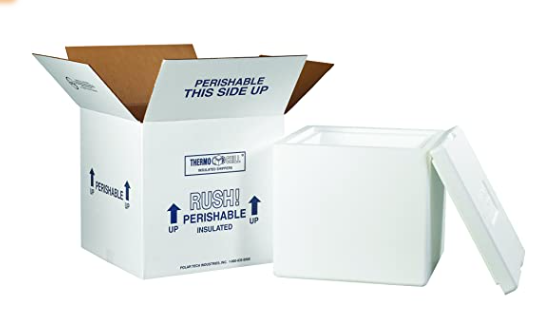Insulated shipping boxes provide solutions to organizations that ship temperature-sensitive goods. In addition, the insulated cases are also used to move the fresh produce over short distances or to store them before shipping or at pick-up centers. The insulation reduces heat flow in and outside the box to help you maintain a constant temperature during transportation or storage.
Organizations that deal with fresh produce, medicine, electronics, or other fragile goods can ship them to different markets regardless of distance or prevailing climate. Like Robert Collier says, “Supply always comes on the heels of demand.” That means you have to move the goods to where they are demanded. While consumers do not worry about how far you have traveled, they want their orders delivered in their best condition. Read on to discover how insulated shipping boxes can help you meet the demand for fresh goods or fragile and temperature-sensitive products.
What Are Insulated Shipping Boxes?
An insulated shipping box is a case that adapts to the external environment condition to protect the goods being transported. Insulation cuts the flow of heat energy to keep the internal temperature consistent. That means an insulated box maintains the right conditions to protect the content from changes in temperature and humidity. The containers may not require operational refrigeration to preserve their content. Preserving the content without refrigeration allows some sections to refer to the box as a non-operational refrigerated container.
Non-operational refrigerated containers differ from standard boxes whose thin metallic walls transfer the changes in temperature to the content. Insulation helps to maintain optimal internal temperature and humidity, notwithstanding the external changes. Insulated shipping boxes help transport perishable goods regardless of the season or length of the voyage.
Why Should Containers Be Insulated?
The main reason for insulating containers is to prevent the content from the external environment. Your choice of a container depends on the commodity being transported and the level of protection required. Depending on the sensitivity of the product, you can go for the standard or insulated container. Insulated shipping boxes are preferred when;
The Product Requires Protection from Heat and Cold
Some goods, such as food and pharmaceutical products, are sensitive to changes in temperature. Transporting such goods in standard boxes may impact their quality and durability. To ship them in their best conditions, you require insulated shipping boxes. The insulation prevents heat or cold from reaching the content and keeps the goods fresh until they get to the consumer.
Protection from Damage
Insulated box liners cushion your goods from mechanical shock. The insulated boxes, therefore, protect breakable items from damage. When shipping fragile items like electronics, glass, and porcelain, you may also use foam, P-nuts, and airbags to ensure the goods are not damaged.
Protection from Static Discharge
Shipping electronic and flammable goods require extra care to protect them from static discharge. Static charges are generated when shipped items rub against each other in transit. Air friction between the airplane or other transport vessels can also create static charges. The electric sparks can damage your electronic goods and leads to losses. Insulation protects your electronics from static charges to ensure the goods reach their destination without damage.
What Products Need Insulated Shipping Boxes
Shippers face challenges in transporting perishable goods or products that are highly sensitive to changes in temperature and humidity. However, insulated containers provide the solution to most of these challenges. Here are some products that require insulated boxes for shipping and storage.
Fresh Products
You should store perishable goods like fruits and vegetables under specific conditions to preserve them. When you pack the goods in insulated shipping containers, you transport them without refrigeration regardless of the distance. The insulated shipping boxes prevent the flow of heat waves to maintain the packaging temperature. This means if you packed the fruits at -100 C, the container maintains an internal temperature of -100 C throughout the shipping period. When you use insulated containers, you can transport fresh produce at any time of the year, regardless of the length of the journey.
Transport Medicines and Drugs
Medicine and drugs are also susceptible to heat and light damage. Shippers must adhere to specific guidelines when transporting drugs and medicine. The insulated shipping boxes come in handy to fulfill such conditions.
Insulated containers can also be used when shippers want to:
Prevent the Development of Microorganisms
Insulated containers create an unfavorable environment for microorganisms to multiply. If the shipper wants to limit the development of microorganisms, the insulation helps to make them inactive and hinders their growth and multiplication.
Extend The Shelf-Life of Fresh Produce
Naturally, fresh produce has a shorter shelf life compared to other products. Using insulated boxes helps prolong the natural shelf-life by slowing ripening and decay. You can also use insulated shipping boxes in warehouses and other storage facilities.
Moving Temperature-Sensitive Products for Short Distances
Sometimes you may need to transport goods that require low temperature for a short distance. Instead of looking for refrigerated trucks, you can pack them in insulated shipping containers to maintain their low temperature during transportation.
Which Container Is The Best Insulator for Shipping?
Selecting an insulated shipping box that best serves you depends on your freight. However, the purpose of an insulated shipping box is to maintain a constant temperature inside the container. A container that helps you ship and store goods in temperature-optimized conditions and environments is the best for your shipping needs.
However, to determine the best-insulated container for specific goods, read their storage temperature and look for a box that meets the minimum requirements.
Looking for Insulated Shipping Boxes? Contact Flexcon
At Flexcon, we understand your unique needs when transporting temperature-sensitive goods. While we appreciate your main aim is to keep the goods under the right temperature, we go a notch higher to improve the overall condition in the box. Our Temp-Pack™ standard Pre-Qualified Insulated Shipping boxes are designed for temperature-sensitive products. Whether you are shipping pharmaceutical, biological, or bio-tech products, -10°C to +40°C temperature range helps keep your goods in their best condition. Regardless of how far you move the goods or the climate, our insulated shipping boxes will preserve your products until they reach the consumer. Contact us today to request more information.





